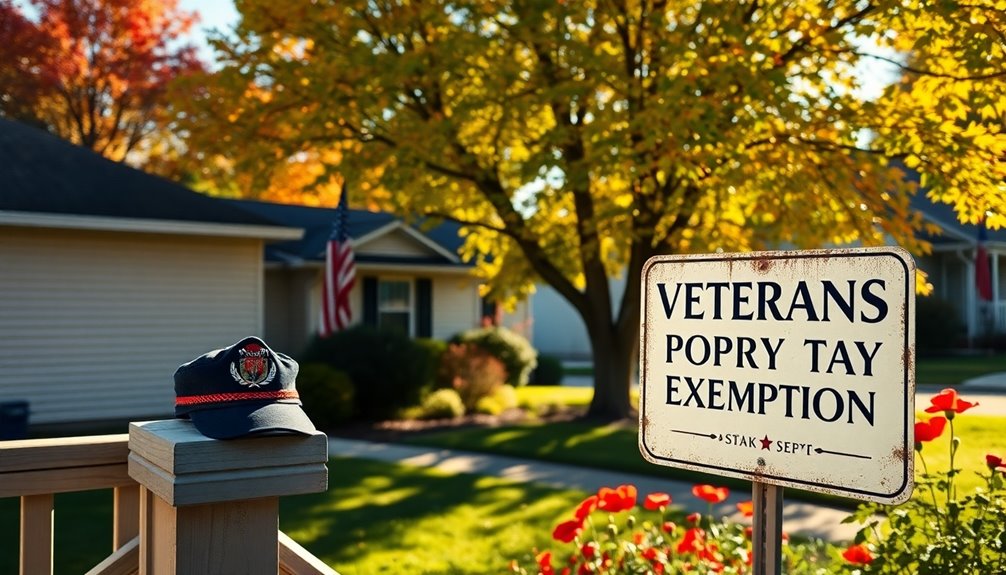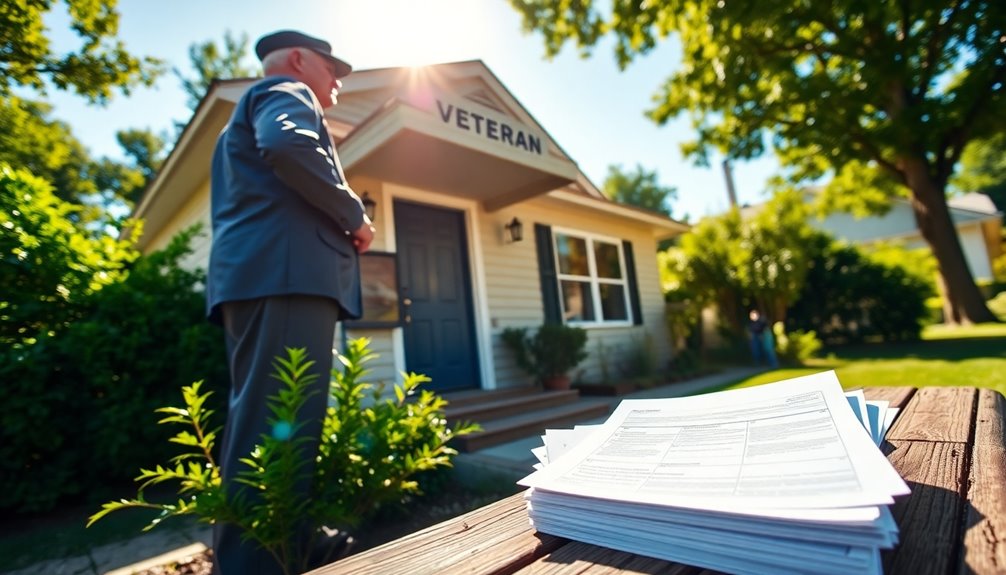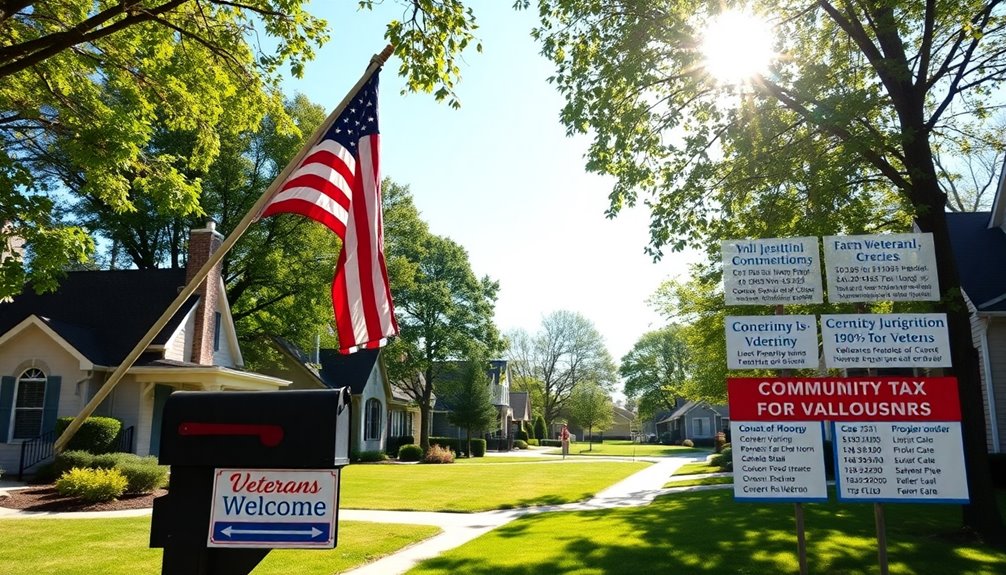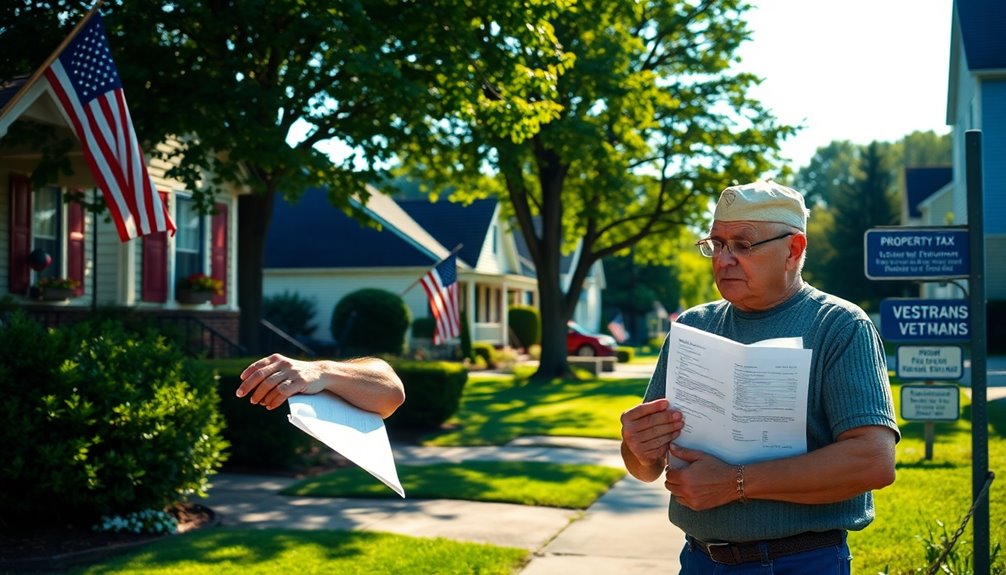Yes, veterans generally pay property taxes like other homeowners. However, if you have a service-connected disability rated at 100%, you might qualify for significant exemptions that can reduce or even eliminate your property tax burden. Each state has different rules, so you'll need to check what's available in your area. While most states offer some form of tax exemption for disabled veterans, you'll want to ensure you're aware of the eligibility criteria and application process. Understanding these details can help you take full advantage of potential savings, and there's more to explore on state-specific benefits.
Key Takeaways
- Veterans are generally required to pay property taxes, similar to other homeowners.
- Many states offer property tax exemptions for veterans with service-connected disabilities, potentially reducing their tax burden.
- Veterans rated 100% disabled may qualify for full property tax exemptions in certain states, such as Florida and Alabama.
- Eligibility for exemptions often depends on factors like service duration, discharge status, and ownership of the primary residence.
- Surviving spouses of veterans may also be eligible for property tax exemptions in most states.
Overview of Property Tax Obligations

Property taxes are a significant financial responsibility for homeowners, including veterans. As a property owner, you're generally subject to these taxes on your real estate, which can include single-family homes, multi-unit dwellings, condominiums, and even manufactured homes.
These taxes play a crucial role in funding local government services, schools, and infrastructure, impacting your community directly. Veterans who have a service-connected disability rated at 100% by the USVA may qualify for property tax exemptions that can significantly reduce their financial burden.
Tax rates and assessed values can vary significantly depending on your jurisdiction, so it's essential to understand how these factors influence your tax bill. Deadlines for tax payments are typically established by local or state authorities, and you need to keep track of them to avoid penalties.
While veterans, like other homeowners, face these obligations, there are specific exemptions available if you meet certain criteria. These exemptions may ease your financial burden, but they require you to prove your eligibility, often through documentation like military records.
Understanding your property tax obligations and the potential for exemptions can help you navigate this financial responsibility more effectively. Being proactive in managing your property taxes ensures that you're not caught off guard by deadlines or payment requirements.
State-Specific Exemptions

Many veterans can take advantage of state-specific exemptions that can significantly reduce their property tax burden. For instance, in New York, the Alternative Veterans' Exemption offers reductions for veterans who served during designated war periods or earned expeditionary medals. This exemption applies to various local taxes, including school district taxes, and provides additional reductions for those with combat or service-connected disabilities.
Massachusetts also provides several exemptions, such as the $400 exemption for veterans with at least a 10% service-connected disability. More substantial exemptions exist, like the $1,250 exemption for veterans who lost both hands, feet, or eyes in service. In addition, many states offer full property tax exemptions for veterans with a 100% P&T VA rating, further enhancing their financial relief.
If you're in Florida and have a 100% Permanent and Total VA rating, you may qualify for full property tax exemption on your primary residence. This also extends to surviving spouses of veterans who passed away from service-related causes.
Always check with your local assessor's office to understand which exemptions you qualify for and the application deadlines. These exemptions can lead to substantial savings, making them well worth exploring.
Eligibility Criteria for Veterans

Veterans seeking property tax exemptions must meet specific eligibility criteria that vary by state.
First, if you're a veteran rated 100% disabled or 100% unemployable due to a service-connected injury, you may qualify. This also includes those who are blind in both eyes or have lost the use of two or more limbs. Unmarried surviving spouses of qualifying veterans can also be eligible, especially if the veteran's death was service-connected.
Your service period matters too. If you served at least 90 days during combat or on active duty, you might be eligible for exemptions. Honorable discharge is required, as shown by a DD-214. Current active-duty personnel can apply if they meet these criteria. Additionally, veterans with a disability rating of at least 10% from Veterans' Affairs can receive increased benefits.
When it comes to income, basic exemptions are available regardless of your total annual income, while low-income exemptions have specific income limits that adjust annually.
You'll need to verify your income for the low-income exemption, but there are no restrictions for the basic one. Additionally, you must own and occupy the property as your primary residence.
Check with your local assessor for more details on documentation requirements.
Application Process and Documentation

Navigating the application process for property tax exemptions can seem daunting, but gathering the right documentation is key to making it smoother.
Start by collecting your identification, proof of disability from the Veterans Administration or your military branch, and your military discharge papers (DD Form 214). If you're in Pennsylvania, you'll also need to fill out VA Form 3288 and provide a copy of your property deed.
Next, complete the appropriate exemption form based on your situation. For 100% disabled veterans in Texas, use Form 50-114. If you're seeking a partial exemption, fill out Form 50-135. In California, you'll need the BOE-261-G form, while Pennsylvania requires the Real Estate Tax Exemption Program Application and the 2023 Disabled Veterans Low-Income Worksheet for low-income applicants. Additionally, be aware that the amount of reduction in property taxes is based on the degree of service-connected disability.
Once you've completed the forms, submit them along with your documentation to the correct office.
Keep an eye on deadlines, such as April 30 for Texas applications and February 15 for low-income exemptions in California. Remember to notify your appraisal district if your eligibility changes to stay compliant.
Local Jurisdiction Variations

Local jurisdictions can mix things up when it comes to property tax exemptions for veterans, so it's crucial to check the specific rules in your area.
For instance, in New York, local jurisdictions have the option to offer additional exemptions like the Alternative Veterans' Exemption, which can vary by school district.
In Louisiana, partial exemptions depend on your disability rating and are unique to each parish.
Texas handles property tax exemptions through local Appraisal Districts and Tax Assessors, meaning the benefits can differ based on where you live.
In Utah, local authorities set specific reduction amounts based on your disability rating, reflecting how local governance impacts veterans' benefits.
If you're in Wyoming, you might find exemptions apply not just to property taxes but even to vehicle license fees.
Each state and local area has its own criteria, from the type of property eligible to age and disability requirements. Almost every state offers property tax exemptions for disabled Veterans, making it essential to stay informed about local regulations.
By understanding these local variations, you can ensure you're maximizing any property tax relief available to you as a veteran.
Benefits for Surviving Spouses

Surviving spouses of veterans may find significant property tax benefits available to them, especially if their loved one died due to a service-connected injury or disease. If this is your situation, you might qualify for property tax exemptions depending on your state's regulations.
Documentation from the USDVA confirming the service-connected death is essential to apply for these exemptions. In many states, the exemption continues as long as you remain unmarried, even if the veteran wasn't eligible during their lifetime. Some states offer full property tax exemptions, while others provide partial exemptions based on the veteran's disability rating. For instance, in Louisiana, the exemption can reach up to $120,000. Additionally, it's important to note that most U.S. states provide property tax exemptions for veterans and their surviving spouses.
To apply, you'll need to submit the necessary forms to your local tax authority, and it's crucial to check for specific requirements in your area. Typically, the exemption applies only to your primary residence, and some states may require annual verification.
For the best outcome, it's wise to consult with your local tax assessor's office to understand the complete process and ensure you're taking full advantage of the benefits available to you.
Additional Financial Benefits

Veterans can access a variety of additional financial benefits beyond property tax exemptions, significantly easing their financial burdens. Many states offer specific tax relief based on disability ratings, allowing you to reduce your property taxes. For instance, in Missouri, veterans with a 30%-49% disability rating receive a $2,500 exemption, while those rated 100% are fully exempt from taxes.
You might also find state-specific exemptions that cater to your unique needs. In Alabama, for example, veterans with a 100% disability rating enjoy a full property tax exemption. Louisiana offers similar benefits, providing full exemptions for veterans with a service-connected disability.
Additionally, you can combine these property tax exemptions with other financial benefits, such as VA pensions and military retirement pay, which can further reduce your financial obligations. Some states, like New York, even provide exemptions for veterans using pension or insurance funds to purchase property.
It's essential to understand the eligibility requirements and application processes specific to your state, as they can vary significantly. Staying informed can help you maximize the benefits available to you and ensure you're not missing out on any financial relief.
Resources for Veterans

Accessing resources tailored for veterans can significantly enhance your quality of life and financial well-being. One vital resource is the property tax exemption, which can reduce or even eliminate your property tax burden if you meet specific criteria.
To qualify, you must be a veteran with a service-connected disability, honorably discharged, and residing in the state where you're applying. There are several types of exemptions available, including the Disabled Veteran Exemption, Alternative Veterans' Exemption, and Cold War Veterans' Exemption, each based on your service history and disability rating. If you're a surviving spouse, you may also qualify for a partial or total exemption, depending on your circumstances. It's important to note that veterans with a 100% disability rating receive a full exemption, providing significant savings.
To access these benefits, you'll need to submit an initial exemption application to your local assessor. Be mindful of deadlines—typically April 30 in Texas and March 1 in New York—although late applications can be accepted for up to five years in Texas. Ensure you provide proof of your disability and honorable discharge. Utilizing these resources can make a significant difference in your financial situation, allowing you to focus more on enjoying life after service.
Frequently Asked Questions
Can Veterans Appeal Property Tax Assessments?
Yes, you can appeal property tax assessments.
Start by filing a written notice of protest with the Appraisal Review Board using Form 50-132. Make sure you submit it by the deadline, usually May 15.
Clearly state your reasons, like excessive value or unequal appraisal.
If the ARB's decision isn't satisfactory, you can appeal to state district court or consider arbitration, depending on your property's value.
Are Property Tax Exemptions Transferable Between States?
Property tax exemptions aren't transferable between states.
Each state has its own rules and eligibility criteria, often linked to disability ratings.
You'll find that what works in one state may not apply in another.
If you move, you'll need to reapply for any exemptions, and those amounts can vary significantly.
Always check your new state's regulations to understand what benefits you might qualify for and how to apply.
Do Property Tax Exemptions Affect Veteran Benefits Eligibility?
Property tax exemptions don't affect your eligibility for veteran benefits.
Your federal benefits, like disability compensation and healthcare, are determined by the VA and aren't tied to any state tax exemptions.
State-specific benefits also operate independently from property tax statuses.
So, if you qualify for an exemption, it won't impact your federal or state benefits.
Just remember, you'll need to provide the right documentation when applying for those exemptions.
Can Veterans Receive Exemptions for Rental Properties?
You generally won't find exemptions for rental properties available to veterans.
Most exemptions, like the Alternative Veterans' Exemption and Cold War Veterans' Exemption, apply strictly to primary residences.
Even if you purchase rental properties using eligible funds, the exemptions still don't extend to them.
Are There Age Restrictions for Property Tax Exemptions for Veterans?
There aren't any age restrictions for property tax exemptions for veterans.
You can qualify for these exemptions regardless of your age, as long as you meet the service criteria. This includes the Alternative Veterans' Exemption, Cold War Veterans' Exemption, and others.
Just make sure to submit your application, along with proof of your honorable discharge, by the deadline, usually March 1.
Your age won't affect your eligibility for these benefits.
Conclusion
In summary, while veterans often have to pay property taxes, many states offer exemptions or reductions based on specific criteria. It's essential to check your state's regulations and understand the application process. Don't forget that surviving spouses may also qualify for benefits. By taking advantage of these resources, you can potentially ease your financial burden. Stay informed and explore all options available to you as a veteran to make the most of your property tax situation.









